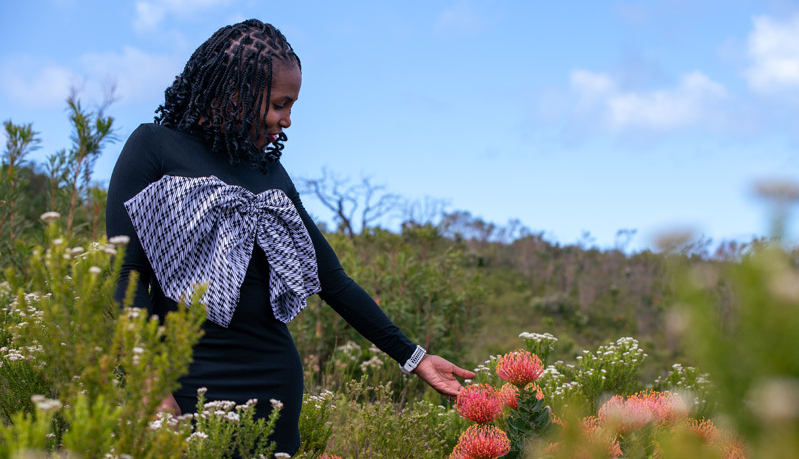
After months of drought, masses of water are flowing through the dirt roads in Kenya, flooding houses and washing away the freshly planted seeds. With climate change, dry and rainy seasons become increasingly extreme and threaten people, landscapes and all of creation in many parts of the world.
Besides climate change another major problem we’re facing globally today is rapid biodiversity loss. The God given balance in working ecosystems plays an important role for all life on earth, including all human life. In times like this, hope is possibly more important than ever, a hope that is spread globally but delivered locally.
In Acts 17:22-23 it is described how Paul went before a meeting in Athens, saying “For as I walked around and looked carefully at your objects of worship, I even found an altar with the inscription: to an unknown god. So you are ignorant of the very thing you worship—and this is what I am going to proclaim to you.” Paul takes some time in Athens to walk around, observe and learn before he starts preaching the gospel, approaching it from local values, traditions and needs.
How can caring for God’s creation be motivated?
Paul came with the intention of spreading a global hope, in a very local context. Just as he delivered his message through the local context of this specific time and place, so it is important for us to spread God’s message of hope through our works and words in a specific context, a context that is increasingly defined by the consequences of climate change. The question is, how can caring for God’s creation be motivated when works are not necessary to be saved?
Genesis 2:15 calls all of humanity to work and take care of God’s creation, yet we don’t ‘earn’ salvation through obedience. It is already freely given to us. There must therefore be another motivation to follow that call.
When Job is in deep despair, God hears his cries and takes him on a tour through God's creation in Job 38-40. There God points out the wonders of nature and in doing so lifts Job’s eyes away from his own problems towards the majesty of creation. In this, God directs Job’s attention to the power and care of the Creator himself. God invites Job to be in awe.
The feeling of awe is an overpowering state of mind when humans experience something vast that can’t be easily grasped, often pointing to a higher power, pointing to God. Through awe and wonder, minds can be shifted and we can be motivated towards actions that care for God’s awesome creation. However, when people face struggles in their daily life awe can too easily be suppressed and difficult to generate. To address those struggles and invite people into awe, it is therefore necessary to get an good understanding of the local situation, just like Paul did.
Kenya is one of the countries highly affected by floods and droughts which destroy entire harvests and therefore threaten people’s livelihoods. Deforestation increases the threat and also leads to conflicts between humans and wildlife for the scarce resources. There is a very local need for action against a very global problem. The "Blooming Desert Project" is a holistic approach to actively reduce the consequences of climate change, mitigate conflicts between humans and wildlife, invite observers to be in awe of the Creator and therefore spread hope.
“The desert and the parched land will be glad; the wilderness will rejoice and blossom. Like the crocus, it will burst into bloom.” (Isaiah 35,1-2)
Inspired by Isaiah 35:1-31, the project aims to let dry lands bloom again, spiritually and physically. Spiritually the mission is to spread hope and share the gospel. Physically it aims to address needs and restore habitats, improving sustainable agriculture, protecting livestock and offering additional sources of income. The project includes a sermon series that works in close collaboration with local pastors to address topics like soil, trees, wildlife and agriculture from a spiritual and practical perspective. Additionally, practical activities like beekeeping, soil erosion exercises, "Farming God’s Way", predator proof livestock enclosures and safaris (among other options) uplift communities, inspiring awe and empowering them to use available resources for change.
In a time when droughts and floods are so often in the news, how valuable would it be to address them before they happen? How wonderful if we could restore the landscape to its natural capacity to nourish all life in abundance? How worthwhile would it be to share the gospel through our works for all our neighbors within our created habitats, encouraging spiritual and physical deserts to bloom again? Would this not be evidence of Jesus' New Creation?
Originally published by A Rocha International. Republished with permission.
Svenja Akwaba (not pictured) is a trained Safari Guide, has a degree in Conservation and Wildlife Management and is currently studying Systematic Theology, in particular creation care theology that motivates action. Since February she has been the Project Manager of the Blooming Desert Project which she developed as her master thesis. She lives in Kenya and Germany, where she is a member of both (friends of) A Rocha groups, and is married to Victor whom she met during her research in Kenya. If you would like to be in touch, ask questions or sign up for her Newsletter you are very welcome to reach out to svenja.akwaba@kontaktmission.org .
A Rocha is a global family of conservation organizations working together to live out God’s calling to care for creation ?and equip others to do likewise. A Rocha means ‘The Rock’ in Portuguese and the initiative is present in more than 20 countries around the world. They provide a missional response to the global crisis of biodiversity loss by carrying out community-based conservation projects, aiming to protect the environment through local, community-based conservation, scientific research, and environmental education.
All of the text in the opinion above is licensed under a Creative Commons Attribution-ShareAlike 4.0 International Licence.





